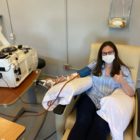Vape Marketing Linked To COVID-19 Draws Critics
|
Vape manufacturers have long been accused of marketing to teens with flavors like mango and cotton candy. Now vaping opponents say vape manufacturers are exploiting the coronavirus with face mask and hand sanitizer giveaways and #COVID-19 discounts. One maker of disposable vapes, Bidi Vapor, declared on Instagram: “A Bidi Stick a day keeps the pulmonologist away.”
The national Campaign for Tobacco-Free Kids says the tactics are hypocritical. Its president, Matthew L. Myers, said it’s imperative that young people quit vaping to avoid being susceptible to COVID-19. “Never before in our history has it been more important for young people to have healthy lungs,’’ Myers said.


